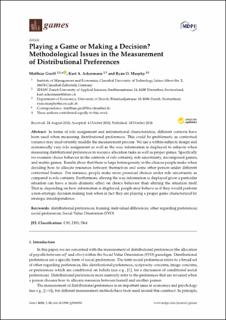Please use this identifier to cite or link to this item:
https://doi.org/10.21256/zhaw-3322Full metadata record
| DC Field | Value | Language |
|---|---|---|
| dc.contributor.author | Greiff, Matthias | - |
| dc.contributor.author | Ackermann, Kurt | - |
| dc.contributor.author | Murphy, Ryan | - |
| dc.date.accessioned | 2019-04-15T08:04:16Z | - |
| dc.date.available | 2019-04-15T08:04:16Z | - |
| dc.date.issued | 2018 | - |
| dc.identifier.issn | 2073-4336 | de_CH |
| dc.identifier.uri | https://digitalcollection.zhaw.ch/handle/11475/16570 | - |
| dc.description.abstract | In terms of role assignment and informational characteristics, different contexts have been used when measuring distributional preferences. This could be problematic as contextual variance may inadvertently muddle the measurement process. We use a within-subjects design and systemically vary role assignment as well as the way information is displayed to subjects when measuring distributional preferences in resource allocation tasks as well as proper games. Specifically we examine choice behavior in the contexts of role certainty, role uncertainty, decomposed games, and matrix games. Results show that there is large heterogeneity in the choices people make when deciding how to allocate resources between themselves and some other person under different contextual frames. For instance, people make more prosocial choices under role uncertainty as compared to role certainty. Furthermore, altering the way information is displayed given a particular situation can have a more dramatic effect on choice behavior than altering the situation itself. That is, depending on how information is displayed, people may behave as if they would perform a non-strategic decision making task when in fact they are playing a proper game characterized by strategic interdependence. | de_CH |
| dc.language.iso | en | de_CH |
| dc.publisher | MDPI | de_CH |
| dc.relation.ispartof | Games | de_CH |
| dc.rights | http://creativecommons.org/licenses/by/4.0/ | de_CH |
| dc.subject | Framing | de_CH |
| dc.subject | Distributional preference | de_CH |
| dc.subject | Individual difference | de_CH |
| dc.subject.ddc | 150: Psychologie | de_CH |
| dc.title | Playing a game or making a decision? : methodological issues in the measurement of distributional preferences | de_CH |
| dc.type | Beitrag in wissenschaftlicher Zeitschrift | de_CH |
| dcterms.type | Text | de_CH |
| zhaw.departement | School of Management and Law | de_CH |
| zhaw.organisationalunit | Institut für Marketing Management (IMM) | de_CH |
| dc.identifier.doi | 10.21256/zhaw-3322 | - |
| dc.identifier.doi | 10.3390/g9040080 | de_CH |
| zhaw.funding.eu | No | de_CH |
| zhaw.issue | 4 | de_CH |
| zhaw.originated.zhaw | Yes | de_CH |
| zhaw.pages.end | 104 | de_CH |
| zhaw.pages.start | 80 | de_CH |
| zhaw.publication.status | publishedVersion | de_CH |
| zhaw.volume | 9 | de_CH |
| zhaw.publication.review | Peer review (Publikation) | de_CH |
| Appears in collections: | Publikationen School of Management and Law | |
Files in This Item:
| File | Description | Size | Format | |
|---|---|---|---|---|
| games-09-00080.pdf | 1.29 MB | Adobe PDF |  View/Open |
Show simple item record
Greiff, M., Ackermann, K., & Murphy, R. (2018). Playing a game or making a decision? : methodological issues in the measurement of distributional preferences. Games, 9(4), 80–104. https://doi.org/10.21256/zhaw-3322
Greiff, M., Ackermann, K. and Murphy, R. (2018) ‘Playing a game or making a decision? : methodological issues in the measurement of distributional preferences’, Games, 9(4), pp. 80–104. Available at: https://doi.org/10.21256/zhaw-3322.
M. Greiff, K. Ackermann, and R. Murphy, “Playing a game or making a decision? : methodological issues in the measurement of distributional preferences,” Games, vol. 9, no. 4, pp. 80–104, 2018, doi: 10.21256/zhaw-3322.
GREIFF, Matthias, Kurt ACKERMANN und Ryan MURPHY, 2018. Playing a game or making a decision? : methodological issues in the measurement of distributional preferences. Games. 2018. Bd. 9, Nr. 4, S. 80–104. DOI 10.21256/zhaw-3322
Greiff, Matthias, Kurt Ackermann, and Ryan Murphy. 2018. “Playing a Game or Making a Decision? : Methodological Issues in the Measurement of Distributional Preferences.” Games 9 (4): 80–104. https://doi.org/10.21256/zhaw-3322.
Greiff, Matthias, et al. “Playing a Game or Making a Decision? : Methodological Issues in the Measurement of Distributional Preferences.” Games, vol. 9, no. 4, 2018, pp. 80–104, https://doi.org/10.21256/zhaw-3322.
Items in DSpace are protected by copyright, with all rights reserved, unless otherwise indicated.